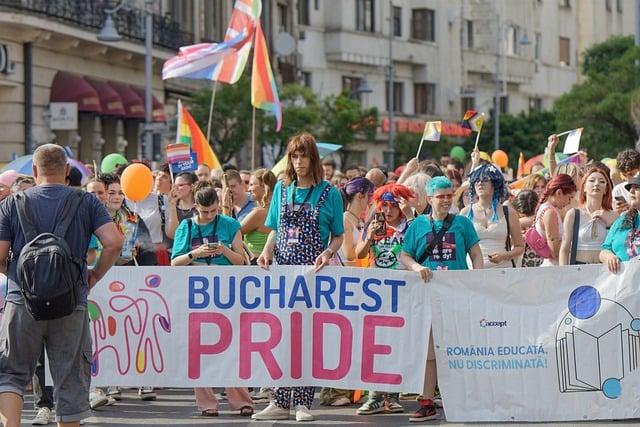In a landmark decision hailed as a significant victory for human rights, Namibia has overturned its outdated “sodomy” laws, which criminalized consensual same-sex relationships. This pivotal ruling, celebrated by advocacy groups such as Amnesty International, marks a critical step toward greater equality and dignity for the LGBTQ+ community in the Southern African nation. The amendment comes amidst a global reassessment of LGBTQ+ rights and reflects a growing recognition of the need for inclusive legislation. As Namibia joins an increasing number of countries that have moved to decriminalize same-sex relations, the implications of this decision signal not only a shift in legal perspectives but also a profound societal conversion in the fight against discrimination and for the protection of human rights for all individuals, irrespective of their sexual orientation.
Namibia’s Landmark Legal Shift and Its Impact on LGBTQ+ Rights
The recent decision by Namibia’s courts to overturn outdated “sodomy” laws marks a pivotal moment in the nation‚Äôs legal landscape and signifies a broader commitment to human rights.This landmark ruling is not just a victory for LGBTQ+ individuals, but also a statement against institutionalized discrimination. The repeal of these laws aligns with global trends towards inclusiveness and equality,reflecting the essential notion that individuals should not face persecution due to their sexual orientation. As an inevitable result, Namibia joins othre progressive nations that recognize the importance of safeguarding the rights of all citizens, irrespective of their sexual identity.
This legal shift opens up new avenues for advocacy and protection of LGBTQ+ rights in Namibia. The country’s commitment to upholding human rights can now be measured by the following key impacts:
- Increased Legal Protection: Individuals can seek legal recourse without the threat of prosecution based on sexual orientation.
- Enhanced Social Acceptance: Overturning such laws may foster a more accepting societal attitude towards LGBTQ+ communities.
- Inspiration for Regional Movements: This decision could inspire neighboring countries to reevaluate their own discriminatory laws.
The ruling not only sets a judicial precedent but also symbolizes hope for many who have long lived in silence. It reinforces the belief that change is possible, and that the fight for equality can lead to tangible results. Moreover,it addresses the pressing need for extensive protections were previously there where none,thus paving the way for future reforms that improve the overall human rights situation in Namibia.

Understanding the Historical Context of Sodomy Laws in Namibia
The overturning of sodomy laws in Namibia is a significant milestone shaped by the country’s colonial past and contemporary struggles for human rights. historically,sodomy laws in Namibia can be traced back to the German colonial administration,which introduced punitive measures against same-sex relations in the late 19th century. Following World War I, these laws were maintained and further entrenched during the apartheid era under South African rule, where oppression and discrimination against marginalized communities, including LGBTQ+ individuals, were state-sponsored. Such historical precedents established a legal framework that criminalized same-sex intimacy, reflecting a broader global pattern of stigmatization.
The societal impact of these laws has been profound, fostering a culture of fear and discrimination that has permeated through generations. Despite Namibia’s current constitutional protections that advocate for individual freedoms and rights, the sodomy laws persisted, creating a paradox between legal ideals and lived realities. In recent years, civil society organizations and international human rights watchdogs have worked tirelessly to challenge these outdated laws, raising awareness about the injustices faced by LGBTQ+ individuals. This culminates in a broader movement for equality and the recognition of sexual diversity in Namibia, emphasizing the necessity for legal reform aligned with human dignity.

Amnesty International’s Role in Advocating for Human Rights Reform
Amnesty International has played a pivotal role in the advocacy for human rights reforms across the globe, and the recent decision in Namibia to overturn restrictive “sodomy” laws is a testament to the tireless efforts of human rights defenders. This historic ruling is not just a legal victory; it represents a significant shift towards the recognition of the rights and dignity of LGBTQ+ individuals. by mobilizing grassroots campaigns, conducting comprehensive research, and leveraging international pressure, Amnesty has highlighted the urgent need for countries to abolish discriminatory laws that perpetuate stigma and marginalization.
The institution has employed various strategies to amplify its message, including:
- Global Campaigns: Initiatives that unite voices across borders to challenge oppressive laws.
- Research and Reports: Detailed documentation of human rights violations that validate the need for reform.
- Public Awareness: Engaging communities through social media and public events to foster understanding and support.
- Legal Advocacy: Working alongside local lawyers and activists to provide legal resources and support.
Considering this landmark ruling in Namibia, it is imperative to recognize the wider implications for human rights within the region. The following table highlights some key impacts of the ruling:
| Impact | Description |
|---|---|
| Enhanced Recognition | Affirms the rights of LGBTQ+ individuals as fundamental human rights. |
| Legal Progress | Sets a precedent for other African nations to reconsider similar laws. |
| Cultural Shifts | Encourages societal acceptance and reduces stigma against LGBTQ+ communities. |
This decision not only highlights the resilience of human rights advocates but also underscores the critical role organizations like Amnesty International continue to play in challenging injustice and fostering a more equitable world.

Insights from Activists: Celebrating Progress While Acknowledging Challenges
Activists around the globe have expressed their elation at Namibia’s landmark decision to overturn antiquated “sodomy” laws,heralding it as a significant step toward equality and human rights for all citizens. This milestone is not just a legal victory; it symbolizes a collective recognition of the dignity and worth of every individual, regardless of sexual orientation. the decision stands as a testament to the relentless advocacy of local NGOs and international organizations like Amnesty International,who tirelessly campaigned for the rights of LGBTQ+ individuals.Their efforts have highlighted the importance of legal reform in dismantling systemic discrimination and ensuring that marginalized communities are afforded protection under the law.
while the news is undoubtedly celebratory, it comes with a call to acknowledge the ongoing challenges faced by LGBTQ+ individuals in Namibia and beyond. Activists stress the need for continued vigilance, as discrimination and social stigma still persist in many communities.Essential actions moving forward include:
- Increasing awareness through educational programs that promote tolerance and acceptance
- Strengthening legal protections to safeguard LGBTQ+ rights
- Supporting grassroots organizations that empower local activists
| Focus Areas | Current Status | Next Steps |
|---|---|---|
| Legal Framework | Overturned sodomy laws | Strengthen anti-discrimination laws |
| Public Attitude | Mixed acceptance | Community engagement initiatives |
| Health Services | Limited access for LGBTQ+ | Improve outreach and support |

Recommendations for Continued Advocacy in the Post-Legislation Era
In the aftermath of the recent legal victory regarding the reversal of sodomy laws in Namibia, it is pivotal for activists and organizations to pivot their strategies towards enduring advocacy efforts. While this legislative change marks a significant step forward for human rights, continuous engagement with local communities is crucial for fostering acceptance and understanding. Actions might include:
- Educational Workshops: Implementing programs that enlighten the public on LGBTQ+ rights and the importance of inclusivity.
- Support Networks: Establishing safe spaces and resources for LGBTQ+ individuals to share their experiences and seek support.
- Policy Monitoring: Keeping an eye on further legislative developments to ensure that any potential backtracking is promptly addressed.
Moreover, collaboration with local and international organizations will be key in amplifying voices that advocate for human rights.Uniting various stakeholders can strengthen the movement and ensure resources are effectively utilized. Recommended collaborative efforts could involve:
- Global Partnerships: Engaging with international human rights groups can offer additional support and visibility for local campaigns.
- Media Engagement: Utilizing media platforms to highlight stories and struggles faced by the LGBTQ+ community in Namibia can foster greater public empathy.
- Legal Support: Providing legal resources to those who may face discrimination or harassment following these changes can help safeguard individual rights.

The Global Implications of Namibia’s Decision on Human Rights Standards
Namibia’s landmark decision to decriminalize consensual same-sex relations marks a pivotal moment not only for the nation but also for the wider global human rights landscape. This ruling challenges pre-existing norms and sets a powerful precedent for other countries grappling with similar legal frameworks. As nations across Africa are frequently enough influenced by colonial-era legislation, namibia’s enlightened stance serves as a beacon of hope, urging others to reconsider their own laws. The potential ripple effects of this decision could pave the way for more inclusive legislation, fostering a climate of acceptance and respect for diversity.
in practical terms, the implications of this ruling are profound. It is indeed anticipated that the shift in legal standards will bolster the voices of LGBTQ+ advocates, empowering them to pursue further reforms. It also highlights the importance of civil society engagement in the fight for human rights. Key advantages include:
- Legal Recognition: Ensuring equal rights under the law for all citizens, irrespective of sexual orientation.
- Increased Advocacy: Promoting activism and dialogue around human rights issues.
- International Solidarity: Strengthening global coalitions that advocate for LGBTQ+ rights.
| Impact Area | Description |
|---|---|
| Legal Reform | Encourages the repeal of unjust laws in other African nations. |
| Social Acceptance | Promotes greater societal understanding and tolerance. |
| Economic Growth | Attracts global businesses that prioritize inclusive practices. |
Wrapping Up
the recent decision to overturn Namibia’s “sodomy” laws marks a significant milestone in the ongoing battle for human rights within the country. As highlighted by Amnesty International, this ruling not only reflects a growing recognition of the rights of LGBTQ+ individuals but also aligns with broader global movements advocating for equality and justice. The decriminalization of consensual same-sex relationships paves the way for enhanced protections against discrimination and violence, fostering a more inclusive society. While challenges remain, this landmark decision serves as a beacon of hope for activists and a testament to the power of advocacy in effecting legal and societal change. As Namibia moves forward, it stands at a pivotal juncture, one that could inspire other nations to confront and dismantle discriminatory laws that impede human rights for all.







